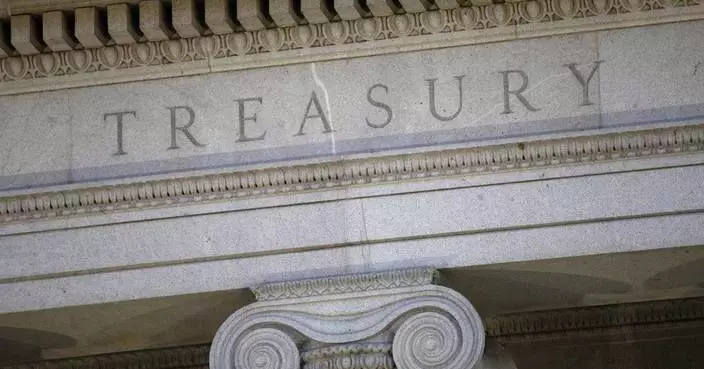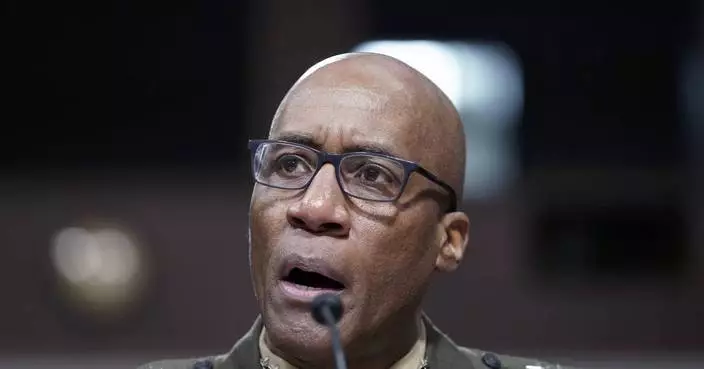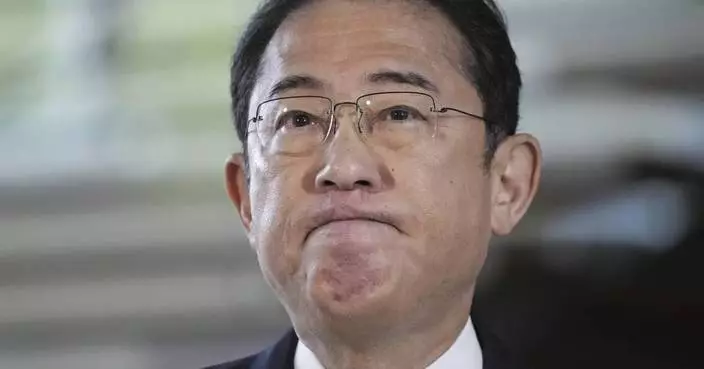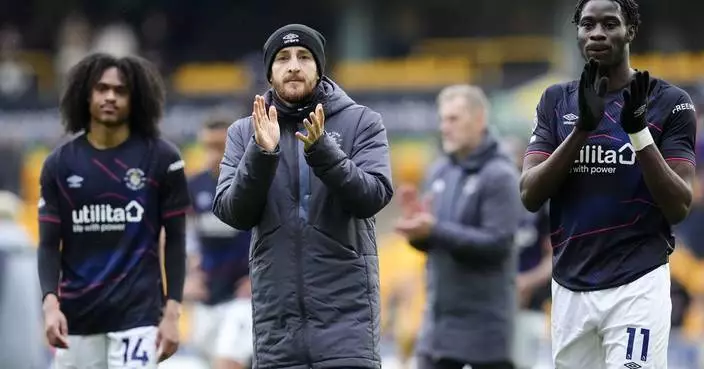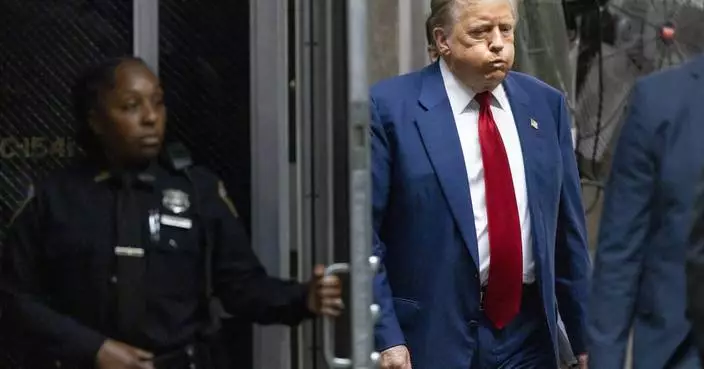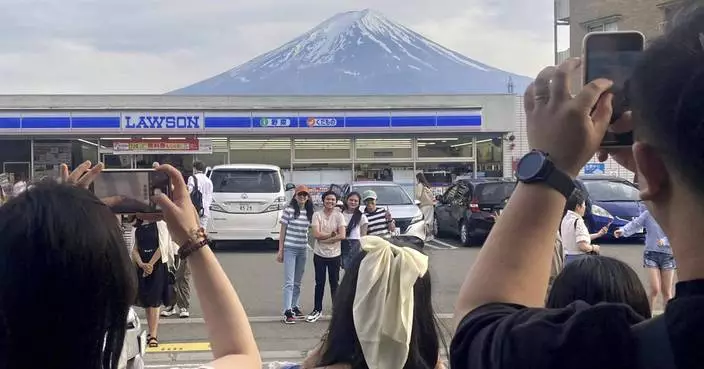The United States and its Asian allies worked Thursday to paper over any semblance of disagreement over President Donald Trump's concession to Kim Jong Un that the U.S. will halt military exercises with South Korea, with Trump's top diplomat insisting the president hadn't backed down from his firm line on North Korea's nukes.
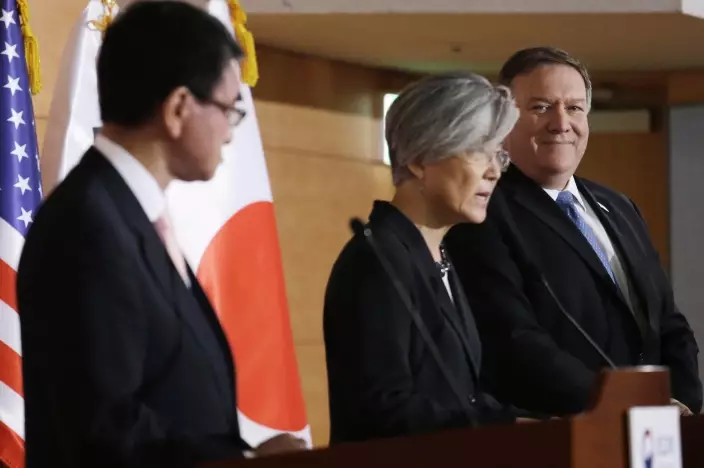
U.S. Secretary of State Mike Pompeo, right, listens to speech of South Korean Foreign Minister Kang Kyung-wha as Japanese Foreign Minister Taro Kono, left, watches during a press conference at the Foreign Ministry in Seoul, South Korea, Thursday, June 14, 2018. (AP Photo/Ahn Young-joon)
U.S. Secretary of State Mike Pompeo, meeting in Seoul with top South Korean and Japanese diplomats, put a more sober spin on several moves by Trump after his summit with Kim in Singapore fueled unease in Washington, Tokyo and Seoul. He said Trump's curious claim that the North's nuclear threat was over was issued with "eyes wide open," and brushed off a North Korean state media report suggesting Trump would grant concessions even before the North fully rids itself of nuclear weapons.
Click to Gallery
The United States and its Asian allies worked Thursday to paper over any semblance of disagreement over President Donald Trump's concession to Kim Jong Un that the U.S. will halt military exercises with South Korea, with Trump's top diplomat insisting the president hadn't backed down from his firm line on North Korea's nukes.
U.S. Secretary of State Mike Pompeo, meeting in Seoul with top South Korean and Japanese diplomats, put a more sober spin on several moves by Trump after his summit with Kim in Singapore fueled unease in Washington, Tokyo and Seoul. He said Trump's curious claim that the North's nuclear threat was over was issued with "eyes wide open," and brushed off a North Korean state media report suggesting Trump would grant concessions even before the North fully rids itself of nuclear weapons.
Pompeo thanked Beijing for its continuing efforts to help achieve the "complete, verifiable and irreversible denuclearization of North Korea." He said both sides had agreed that sanctions would not be eased until that's achieved.
"We believe that the sanctions themselves are not the end," Geng said.
Trump's announcement minutes after the summit's conclusion that he would halt the "provocative" joint military drills were a shock to South Korea and caught much of the U.S. military off guard, too. Pyongyang has long sought an end to the exercises it considers rehearsals for an invasion, but U.S. treaty allies Japan and South Korea view them as critical elements of their own national security.
"This is a matter that military officials from South Korea and the United States will have to discuss further and coordinate," Kang said.
"We're going to get denuclearization," Pompeo said in the South Korean capital. "Only then will there be relief from the sanctions."
Pompeo flew from Seoul to China's capital, Beijing, later Thursday for a meeting with President Xi Jinping, whose country is believed to wield considerable influence with North Korea as its chief ally and economic lifeline.
"I also want to thank China and President Xi for his role in helping bring North Korea to the negotiating table," Pompeo said in a briefing with reporters.
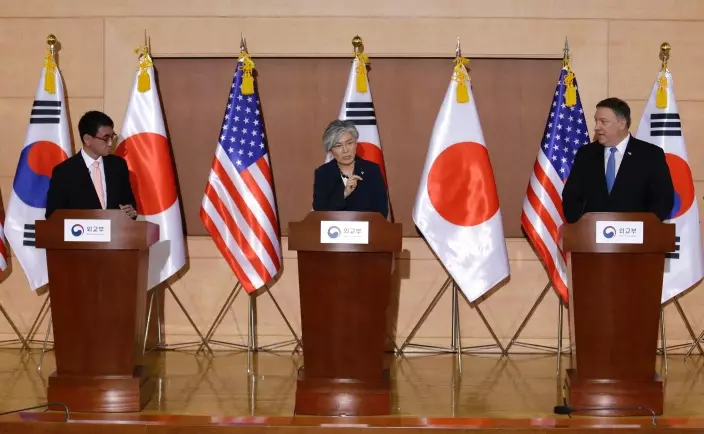
South Korean Foreign Minister Kang Kyung-wha, center, speaks as U.S. Secretary of State Mike Pompeo and South Korean Foreign Minister Kang Kyung-wha listens during a press conference at the Foreign Ministry in Seoul, South Korea, Thursday, June 14, 2018. (AP Photo/Ahn Young-joon)
Pompeo thanked Beijing for its continuing efforts to help achieve the "complete, verifiable and irreversible denuclearization of North Korea." He said both sides had agreed that sanctions would not be eased until that's achieved.
Chinese Foreign Minister Wang Yi, in remarks at the start of his meeting with Pompeo, described the Singapore summit as of "great historic significance" that could lead to "enduring peace." Wang said the U.S. should continue to "work through China."
Pompeo said there was still a risk that denuclearization might not be achieved and added there more work to be done by Beijing and Washington.
At a daily briefing, foreign ministry spokesman Geng Shuang reiterated China's support for a political settlement, while also pointing to an eventual lifting of United Nations Security Council economic sanctions.
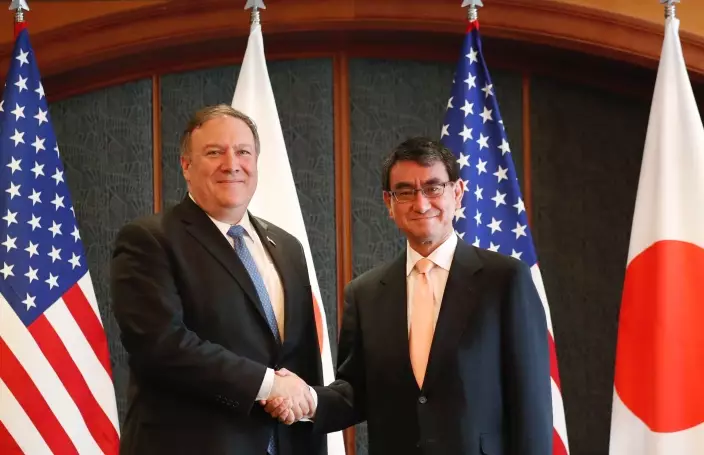
U.S. Secretary of State Mike Pompeo shakes hands with Japan's Foreign Minister Taro Kono during a bilateral meeting at a hotel in Seoul, South Korea June 14, 2018. REUTERS/Kim Hong-ji/Pool
"We believe that the sanctions themselves are not the end," Geng said.
China has been praised by Trump for ramping up economic pressure on the North that the U.S. believes helped coax Kim to the negotiating table.
On the joint U.S.-South Korea drills that Trump — after meeting Kim — said would be terminated, Pompeo emphasized a key caveat: If the mercurial North Korean leader stops negotiating in good faith, the "war games" will be back on.
The words of reassurance from Pompeo came as diplomacy continued at an intense pace after Tuesday's summit in Singapore, the first between a sitting American president and North Korea's leader in six decades of hostility. In the village of Panmunjom along the North-South border, the rival Koreas on Thursday held their first high-level military talks since 2007, focused on reducing tensions across their heavily fortified border.
Yet even as U.S. and South Korean officials sought to parlay the momentum from the dramatic summit into more progress on the nuclear issue, there were persistent questions about whether Trump had given away too much in return for too little.
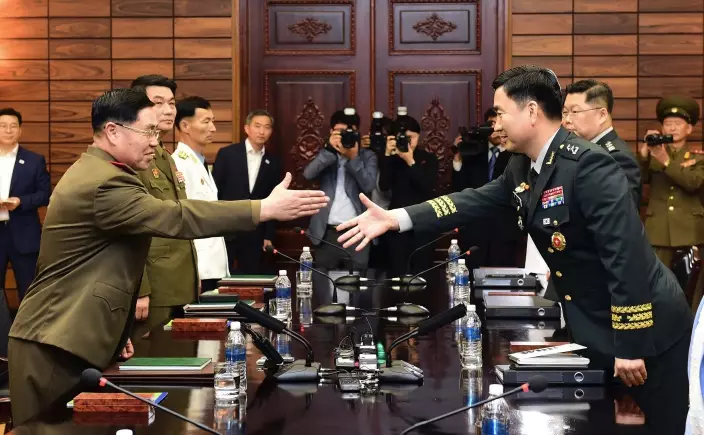
In this photo provided by South Korea Defense Ministry, South Korean Maj. Gen. Kim Do-gyun, right, tries to shakes hands with his North Korean counterpart Lt. Gen. An Ik San during a meeting at the northern side of Panmunjom in the Demilitarized Zone, North Korea, Thursday, June 14, 2018. (South Korea Defense Ministry via AP).
Trump's announcement minutes after the summit's conclusion that he would halt the "provocative" joint military drills were a shock to South Korea and caught much of the U.S. military off guard, too. Pyongyang has long sought an end to the exercises it considers rehearsals for an invasion, but U.S. treaty allies Japan and South Korea view them as critical elements of their own national security.
So Pompeo had some explaining to do as he traveled to Seoul to brief the allies on what transpired in Singapore.
In public, at least, South Korea's leader cast the summit's outcome as positive during a short meeting with Pompeo at the Blue House, South Korea's presidential palace. President Moon Jae-in, an avowed supporter of engagement with North Korea, called it "a truly historic feat" that had "moved us from the era of hostility towards the era of dialogue, of peace and prosperity."
Still, there were signs as Pompeo met later with the top Japanese and South Korean diplomats that concerns about the freeze had not been fully resolved. South Korean Foreign Minister Kang Kyung-wha, speaking in Korean, told reporters afterward that the military drills issue "was not discussed in depth."
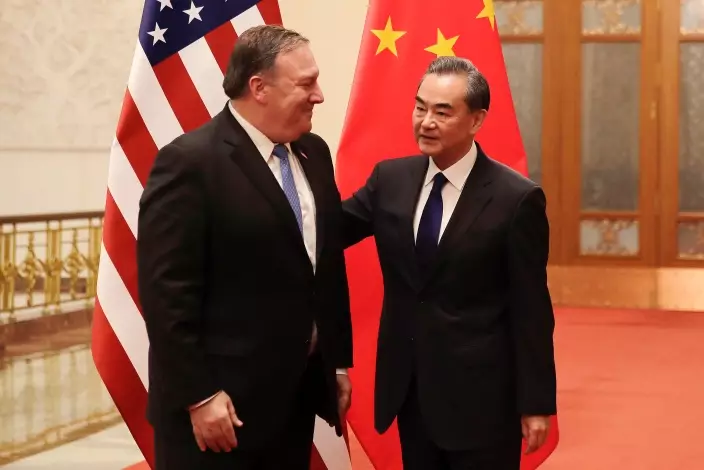
U.S. Secretary of State Mike Pompeo, left, chats with Chinese Foreign Minister Wang Yi before their meeting at the Great Hall of the People in Beijing, Thursday, June 14, 2018. (AP Photo/Andy Wong, Pool)
"This is a matter that military officials from South Korea and the United States will have to discuss further and coordinate," Kang said.
The U.S. has stationed combat troops in South Korea since the end of the Korean War and has used them in a variety of drills. The next scheduled major exercise, involving tens of thousands of troops, normally would be held in August.
The summit in Singapore did mark a reduction in tensions — a sea change from last fall, when North Korea was conducting nuclear and missile tests, and Trump and Kim were trading threats and insults that stoked fears of war.
Kim is now promising to work toward a denuclearized Korean Peninsula and state media heralded the meeting as victorious, with photos of Kim standing side-by-side with Trump on the world stage splashed across newspapers in Pyongyang. On Thursday, North Koreans finally got a glimpse of video of Trump and Kim together, as official Korean Central Television broadcast the first footage of Kim's trip to Singapore.
Trump seemed equally ecstatic. As he landed Wednesday in Washington following the summit, he declared on Twitter that America and the world can "sleep well tonight."
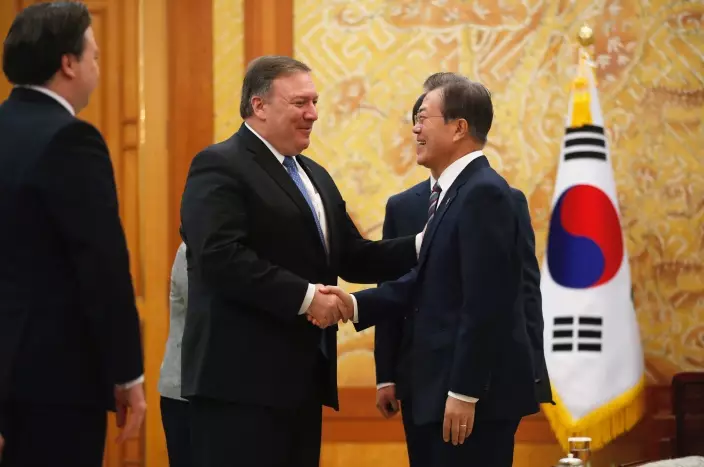
U.S. Secretary of State Mike Pompeo attends a bilateral meeting with South Korea's President Moon Jae-in at the presidential Blue House in Seoul, South Korea June 14, 2018. REUTERS/Kim Hong-ji/Pool
"There is no longer a Nuclear Threat from North Korea," Trump wrote, even though North Korea has yet to give up any of its fissile material, estimated by independent experts to be enough for between about a dozen and 60 nuclear bombs.
Pompeo rejected the suggestion that Trump's assertion was premature. He said Trump was proceeding "with eyes wide open" to the prospect that diplomacy may falter, and that Trump was merely reflecting the historic nature of his confab with Kim. The Korean War ended in 1953 without a peace treaty, leaving the United States and North Koreas in a technical state of war.
With the Trump-Kim summit concluded, the baton was being passed to lower-level U.S. and North Korean officials, who Pompeo said would likely resume meeting as early as the next week to hash out details of a disarmament deal, sure to be a complex and contentious process. He said the U.S. was hopeful North Korea would take "major" disarmament steps before the end of Trump's first term in office, which concludes in January 2021.
In the brief, four-point joint statement signed at the summit, North Korea committed "to work toward complete denuclearization of the Korean Peninsula" — a promise it has made and reneged on several times in the past 25 years.
The statement made no mention of verification, despite Trump's longstanding insistence on "complete, verifiable and irreversible" denuclearization. But Pompeo bristled at reporters who pressed him about that apparent omission, calling questions on the topic "insulting and ridiculous."
The omission is irrelevant, Pompeo said, adding that he was confident the North Koreans fully understood that verification would be a necessity. He pointed out that the statement makes reference to a previous agreement that did mention verification, and argued that as a result, the Trump-Kim statement automatically "incorporates" verification without having to state it outright.
WASHINGTON (AP) — The last thing standing between Ashnaelle Bijoux and her college dream is the FAFSA form — a financial aid application that's supposed to help students go to college, but is blocking her instead. She has tried to submit it over and over. Every time, it fails to go through.
“I feel overwhelmed and stressed out,” said Bijoux, 19. She came close to tears the last time she tried the form. “I feel like I'm being held back."
Normally a time of celebration for high school seniors, this spring has been marred by the federal government's botched rollout of the new FAFSA application. By May 1, students usually know where they're headed to college in the fall. This year, most still haven't received financial aid offers. Three months before the start of fall classes, many don't know where they're going to college, or how they're going to pay for it.
“We’re asking them to make probably one of the biggest financial decisions — and decisions that will have the biggest implications on their lives going forward — without all of the information,” said Justin Draeger, president and CEO of the National Association of Student Financial Aid Administrators.
The FAFSA, or Free Application for Federal Student Aid, went through a massive overhaul that was supposed to make it simpler and shorter. But a series of blunders by the Education Department made it harder than ever, delaying college decisions by months and raising fears that hundreds of thousands of students will forgo college entirely.
Across the United States, the number of students who have successfully submitted the FAFSA is down 29% from this time last year, and it’s even worse at schools with more low-income students, according to the National College Attainment Network.
The group's CEO, Kim Cook, warned members of Congress this month about a potentially “catastrophic” drop in college enrollments that would make the decreases of the pandemic seem mild.
For Bijoux, of Norwich, Connecticut, the FAFSA problems threaten to undermine the promise of higher education.
To her, college is a chance to seize the opportunities that weren't available to her mother, who immigrated from Haiti to the U.S. as an adult. Bijoux hopes to become a therapist and set a positive example for her three younger brothers.
If her FAFSA goes through, she should be eligible for enough financial aid to help with the $ 13,000-a-year tuition at Southern Connecticut State University. If not, she might go to a local community college, but even that would require loans if she can't complete the FAFSA.
“That’s why it hurts, because it’s like you work so hard to go somewhere and do something and make something of yourself,” Bijoux said. “I thought I would start at a four-year (college) and then work hard continuously, like I’ve been doing basically my whole life. But that’s not the case.”
The updated FAFSA form has one section filled out by students and another by their parents. But when Bijoux finishes her part, nothing shows up on her mom's online account. She keeps trying, but nothing seems to change.
Similar problems have been reported across the country, along with numerous other bugs that the Education Department has scrambled to fix. Families who call for customer service have faced long wait times or say the call center hung up on them.
It “drains all the momentum” from families working to send their children to college, especially those navigating the process for the first time, said Anne Zinn, a counselor at Norwich Free Academy, where Bijoux goes to school.
“I can only say so many times, ‘Just be patient, just be patient,’ before they throw their hands up and they’re like, ‘Why am I doing this? I’m just gonna go get a job,'" she said.
The rollout has attracted bipartisan criticism in Congress, and it's being investigated at the request of Republicans. Last week, Richard Cordray, the federal student loan chief who oversaw the FAFSA update, announced he's stepping down at the end of June.
For colleges, too, the delays pose a major threat.
Enrollment decreases like those being projected now could put many small colleges out of business, or necessitate deep cuts in staff. Some colleges are pushing for emergency relief just to stay afloat, said Angel Pérez, CEO of the National Association for College Admission Counseling.
“If they don’t get checks from the federal government to basically get them through next year, they will not survive,” Pérez said.
The FAFSA has been the linchpin of student financial aid for decades. It's used to determine eligibility for the federal Pell grant, a scholarship for low-income students, and it's required to receive federal student loans. Colleges and states also use FAFSA to distribute their own scholarships.
FAFSA had long been maligned for being tedious, difficult and intimidating to families without college experience. Congress passed legislation in 2020 meant to simplify the form. The Education Department was ordered to reduce the number of questions from more than 100 to about 40, and change the formula to expand aid to more students.
Problems started piling up as soon as the new form went online in December, already months overdue.
The first applications were incorrectly processed using an outdated calculation for inflation. Later, a federal contractor miscalculated a different formula on more than 200,000 applications. Each mistake added to delays, leaving students waiting longer to hear anything about financial aid.
Even more worrisome is a misstep that blocked students from finishing the form if they have a parent without a Social Security number. Advocates say the system locked out hundreds of thousands of students who are U.S. citizens or permanent residents but whose parents are not.
The Education Department on Tuesday said it's giving those parents a new way to enter their tax information manually. But as recently as this week, some students said they were still blocked from submitting the form.
Federal education officials say they're addressing lingering bugs but making progress. More than 8 million student applications have now been processed and sent to colleges, the agency said, and new applications are being processed within three days.
Still, the wait is far from over. It usually takes weeks for schools to prepare financial aid offers. Some colleges have extended decision deadlines to give students more time to weigh their options. But some stuck to May 1, forcing students to choose a college — and make a nonrefundable payment to hold their spot — without knowing all their scholarship options.
In West Virginia, Gov. Jim Justice on Tuesday declared a state of emergency that allows students to receive state scholarships without having their FAFSA processed by the federal government. West Virginia has the lowest number of college graduates in the nation, and the state’s high school FAFSA completion rates are currently down nearly 40%, said Justice, a Republican.
"Really and truly, a lot of kids are sitting on the sidelines ... wondering, ‘Am I going to be able to go to college?’ ” he said during a news briefing.
In Baltimore, Camryn Carter is waiting to find out if he'll get a full ride to the University of Maryland or face tens of thousands of dollars in student loans.
A top student and captain of his baseball and wrestling teams, Carter sees college as a step up in life. He thinks back to the times in the grocery store line when he had to put items back on the shelf because his mom couldn't afford the bill. A college degree would give him the stability he didn't always have, the 18-year-old said.
But when he looks at tuition, it's intimidating. Along with Maryland, he's also considering McDaniel College, a private school in Maryland. If he enrolls there, he expects to borrow almost $30,000 a year.
“I try to make the best decisions now so I can have a good future,” he said. “I'm a little nervous that things won't work out. But I'm faithful.”
__
Leah Willingham contributed reporting from Charleston, West Virginia.
__
The Associated Press’ education coverage receives financial support from multiple private foundations. AP is solely responsible for all content. Find AP’s standards for working with philanthropies, a list of supporters and funded coverage areas at AP.org.

Ashnaelle Bijoux poses on campus, Saturday, April 27, 2024, at Norwich Free Academy in Norwich, Conn. Bijoux, a senior at NFA, has been unable to complete the FAFSA form due to a glitch with the form. Without the form and the financial aid it brings, Bijoux won't be able to pursue her goal of going to Southern Connecticut State University to become a therapist. (AP Photo/Jessica Hill)

Ashnaelle Bijoux poses on campus, Saturday, April 27, 2024, at Norwich Free Academy in Norwich, Conn. Bijoux, a senior at NFA, has been unable to complete the FAFSA form due to a glitch with the form. Without the form and the financial aid it brings, Bijoux won't be able to pursue her goal of going to Southern Connecticut State University to become a therapist. (AP Photo/Jessica Hill)
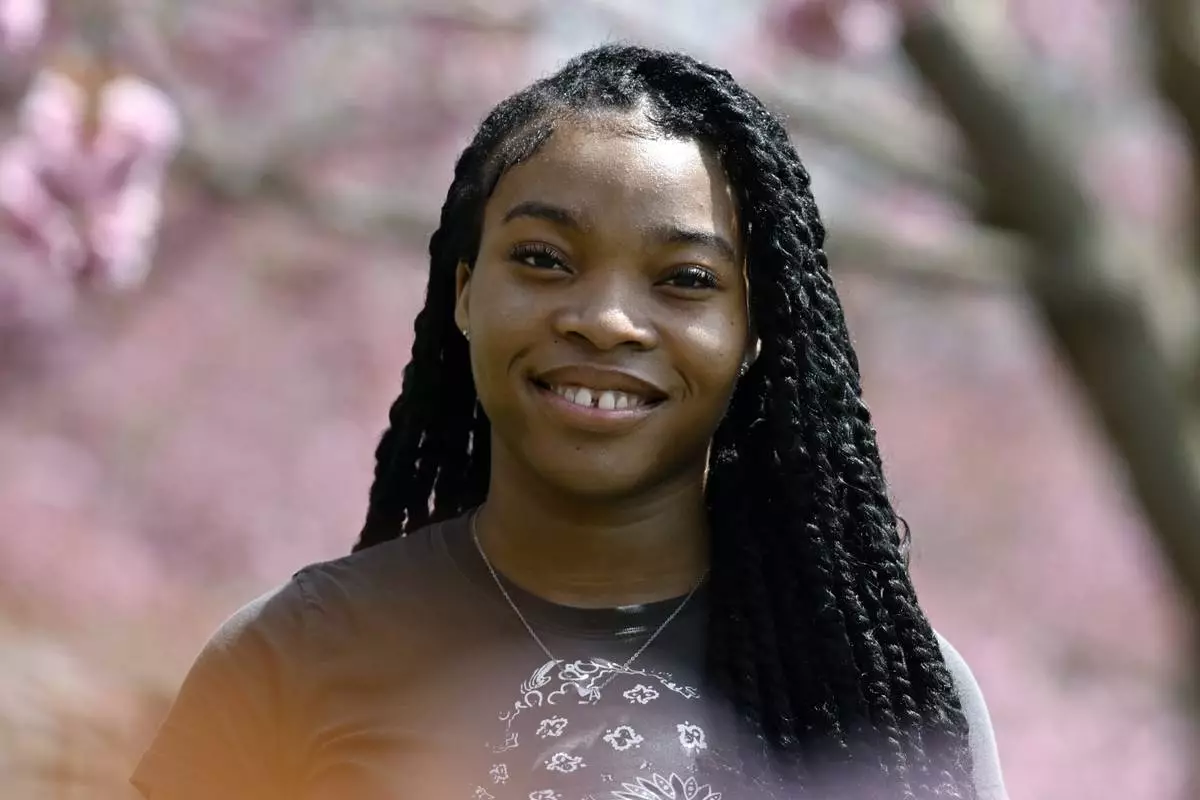
Ashnaelle Bijoux poses on campus, Saturday, April 27, 2024, at Norwich Free Academy in Norwich, Conn. Bijoux, a senior at NFA, has been unable to complete the FAFSA form due to a glitch with the form. Without the form and the financial aid it brings, Bijoux won't be able to pursue her goal of going to Southern Connecticut State University to become a therapist. (AP Photo/Jessica Hill)

Ashnaelle Bijoux poses on campus, Saturday, April 27, 2024, at Norwich Free Academy in Norwich, Conn. Bijoux, a senior at NFA, has been unable to complete the FAFSA form due to a glitch with the form. Without the form and the financial aid it brings, Bijoux won't be able to pursue her goal of going to Southern Connecticut State University to become a therapist. (AP Photo/Jessica Hill)














